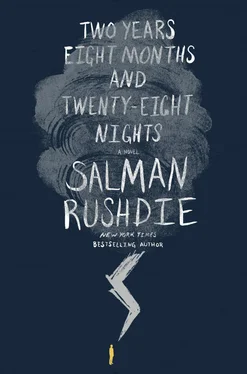Their pursuer and nemesis did not see himself as an artist. He was Jimmy Natraj, god of destruction, dancing his destruction dance.
Zumurrud the Great declared that his Foundation was only the first step towards the creation of the global jinn sultanate, whose worldwide authority he now proclaimed, and also his own anointment, by his own hand, as the first sultan. At once, however, the other three Grand Ifrits expressed their displeasure at his self-declared primacy, and he was obliged to backtrack a little. Because he could not vent his annoyance on the other three members of the ruling quadrumvirate, Zumurrud embarked on a wild international spree of decapitations, crucifixions and stonings that created, in the very first days of the sultanate, a groundswell of hatred that would, in short order, fuel the counterrevolution. His alliance with the vicious and illiterate Swots of A. gave him what passed for a program of governance, and he set about enthusiastically proscribing things just the way they did, poetry, bicycles, toilet paper, fireworks, love stories, political parties, French fries, eyeglasses, root canal dentistry, encyclopedias, condoms, and chocolate, and burning anyone who raised an objection at the stake, or chopping them in half, or, as he gained enthusiasm for the work, hanging, drawing and quartering them, the traditional and excellent English penalty for high treason ever since the thirteenth century. He was willing (he told the other Grand Ifrits) to learn the best lessons of the former imperial powers, and announced the inclusion of these medieval penalties in the legal code of the new sultanate, with immediate and devastating effect.
Most idiosyncratically of all, he declared his implacable enmity towards all forms of sealable containers, all jars with lids that could be screwed down or bottles that could be corked, all trunks with locks, all pressure cookers, all safety-deposit boxes, coffins and tea chests. His fellow Grand Ifrits Shining Ruby and Ra’im Blood-Drinker had no memories of incarceration, and reacted to these declarations with dismissive shrugs. But, he told them, once you’ve spent an eternity trapped in glass you develop a hatred of your jail cell. “As you wish,” Shining Ruby said, “but wasting one’s time on little things is not the hallmark of greatness.” Zumurrud ignored this slight. Men had imprisoned him. Now he would have his turn. That was a hatred in him born of those prison years that could not be assuaged, not by all the proscriptions and executions in the world. Sometimes he thought he did not so much wish to rule over the human race as to preside over its brutal extinction.
In this matter at least, Zabardast, who had also known imprisonment, was in full agreement with Zumurrud: it was time for vengeance.
The revenge of the jinn burns with unquenchable fire.
It wasn’t long before Zumurrud’s bloodthirstiness began to worry what remained of Ghazali. The philosopher’s dust, when informed by the great jinni of the thoroughness with which he was fulfilling the dead man’s demand that the human race be made afraid so that their fear might drive them to the divine, was obliged to consider the difference between scholarly theory and bloody practice, and concluded that Zumurrud, while undeniably assiduous, might have, in a certain sense, gone too far. When Zumurrud heard this he understood that the philosopher was no longer useful to him. He had gone beyond anything that could be taught by this old dead fool. “My duty to you is done,” he told Ghazali. “I return you to the silence of the grave.”
Zabardast, always the more controlled of the two senior dark jinn, always the more inward and soft-spoken (though in reality no less ruthless, perhaps even more so, because of his greater intelligence), proposed that the new sultanate be quartered, like the bodies Zumurrud was hacking to bits. It was too large to be centrally governed and Zumurrud’s “Foundation” in the remote land of A. was scarcely a grand metropolis, fit to be a capital city. It was already the case, he pointed out, that most of Zumurrud’s activity was in what might loosely be called the “East,” whereas he himself has done his best work, made the most mischief and created the most fear, in the powerful “West.” That left Africa and South America for Ra’im Blood Drinker and Shining Ruby. The rest of the world — Australasia, Polynesia, and the territories of penguins and polar bears — could probably be ignored for the moment.
This was a dispensation that pleased nobody, not even its proposer (for Zabardast secretly planned to take over the whole world), but which all four Grand Ifrits briefly accepted— briefly, until the quarrels began. Shining Ruby was particularly displeased with his lot. The jinn are happiest in those lands in which their stories are best known, more or less at home in lands to which their stories traveled in the baggage of migrant peoples, and ill at ease in zones less known to them, in which they too are less known. “South America?” complained Shining Ruby. “What do they know about magic there?”
Their wars of conquest sprang up like black flowers all over the globe, and many of these were small proxy wars, waged by men controlled by the jinn in every way a man can be controlled, by possession, enchantment, bribery, fear, or faith. The dark jinn sat indolent on their clouds wrapped in fogs of invisibility so thick that for a long time even Dunia couldn’t make out where her mightiest enemies were. They sat up there watching their puppets kill and die and sometimes they sent the lesser jinn down to join in the destruction. Within a very short time, however, the old failings of the jinn — their disloyalty, their lack of application, their whimsicality, their selfishness, their egotism — rose to the surface. Each of the four quickly came to believe that he and he alone was, and should be recognized as, the grandest of the grand, and what began as squabbling escalated at speed and changed the nature of the conflict in the lower world. This was when the human race became the canvas upon which the dark jinn painted their mutual hatred, the raw material from which each of the quartet sought to forge the saga of his own absolute supremacy.
Looking back, we tell ourselves this: the craziness unleashed upon our ancestors by the jinn was the craziness that also waited inside every human heart. We can blame the jinn, and we do, we do. But if we are honest we must blame human failings too.
It is painful to record that the dark jinn took particular pleasure in watching assaults on women. In the age before the separation of the Two Worlds women in most parts of the world had been considered to be secondary, lesser entities, chattels, homemakers, to be respected as mothers but otherwise disdained, and though these attitudes had changed for the better in some parts of the planet at least, the dark jinn’s belief that women were provided for men’s use and support were still those of the dark ages. In addition the frustrations caused by the sexual boycott imposed by the jinnia population of the upper world had made them angry, and so they watched without criticism as their proxies turned violent, as women were not only violated but killed thereafter, these new women, many of whom rejected the idea of their inferiority, and needed to be put back in their place. Into this war against the female gender Queen Dunia sent a soldier of her own, and the tide of battle began to turn.
Teresa Saca had her superhero name now. Not Madame Magneto or any of that tabloid nonsense, that was comic book stuff. Dunia’s voice in her head saying I’m your mother. I too will be something’s mother, she told herself, I will be Mother, the fiery mama of death itself. That other, more saintly Mother Teresa, she had been in the death business too, but Teresa Saca was more interested in the sudden-death variety than in hospices, no easing of the living into soft oblivion for her, just a hammer blow of voltage to bring life to a hard full stop. She was Dunia’s avenging angel, the avenger, or so she told herself, of every spurned, wronged, abused woman who had ever lived.
Читать дальше












